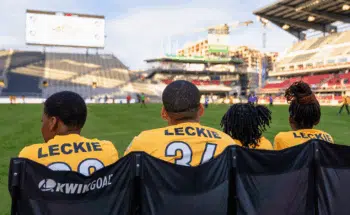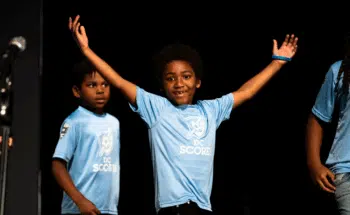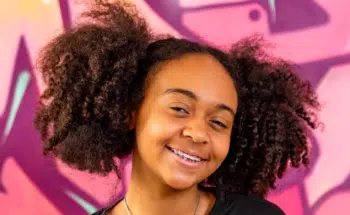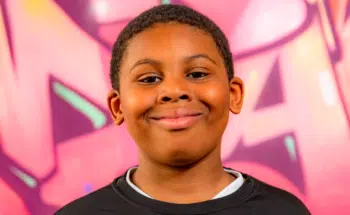“It Just Hits Different”: DC SCORES Poetry Specialist Munazza Abraham Reflects on the Power of Poetry Ahead of Womxn of the World Poetry Slam Debut
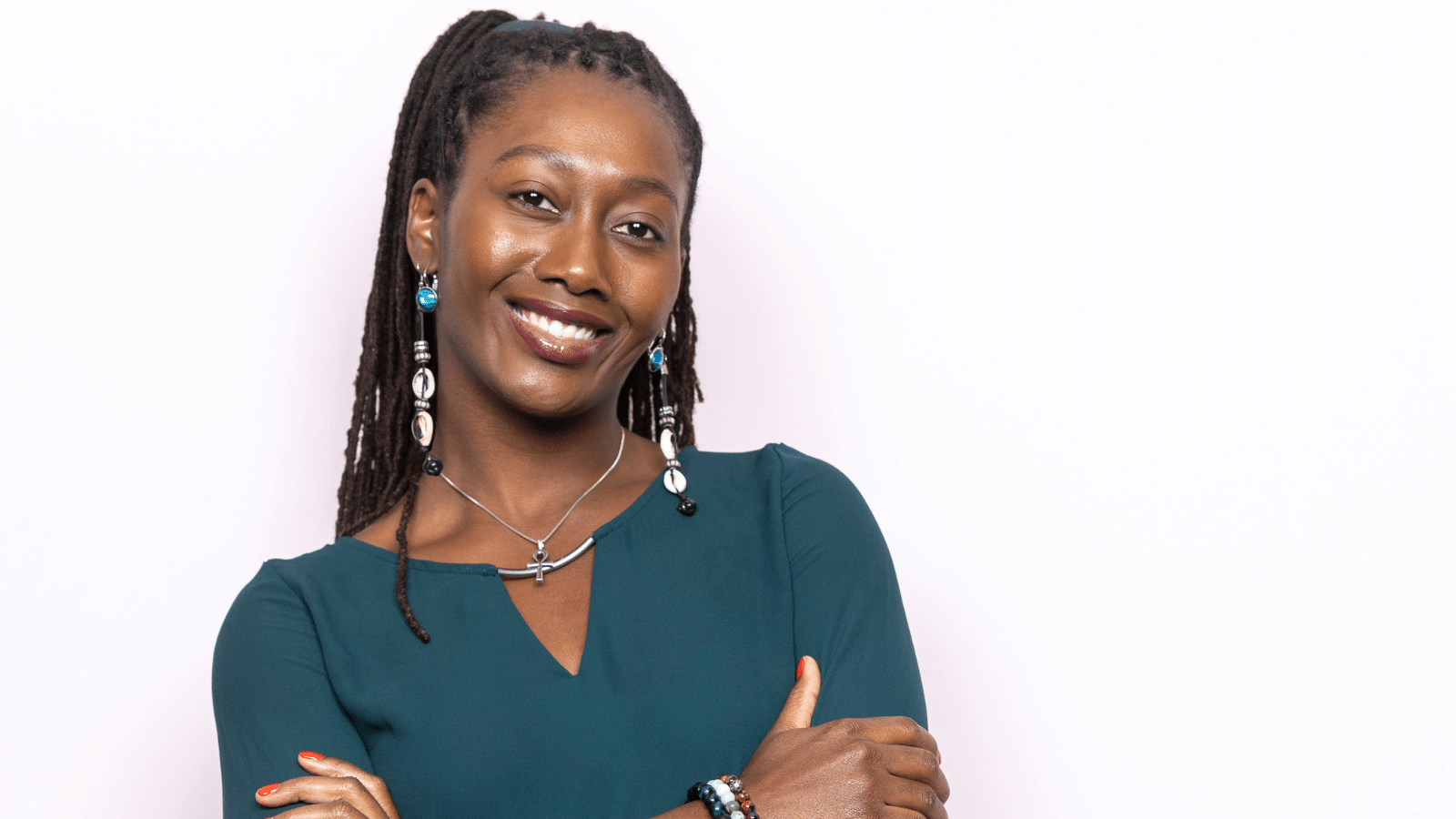
Munazza uses her work as both a poet and a clinical and community psychology Ph.D. student to draw attention to the experiences of historically oppressed communities.
When Munazza Abraham first encountered poetry, she was in the 4th grade of elementary school in Jacksonville, North Carolina. The descriptive nature poems she studied in class piqued her interest but didn’t feel particularly relatable. “The poetry I grew up learning never really felt that personal,” Munazza recalls.
“We were taught the very traditional way of writing poetry, with rhymes and all the other standard structures,” she continues. “But I never really liked structure.”
Throughout her life, Munazza — a spoken-word artist and doctoral candidate in Clinical and Community Psychology at the University of Maryland Baltimore County (UMBC) — has challenged the orthodoxy of authorities, whether they determine what makes it into the poetic cannon or whose rights are protected, or denied, by political power structures.
This week, Munazza is competing for the first time in the Womxn of the World Poetry Slam (WOWPS), where she will perform a very different kind of poetry from the conventional works she learned in grade school. When Munazza is on the mic, few topics are taboo and she doesn’t shy away from addressing big issues such as misogyny, racism, and classism. Her work is also deeply personal.
“Slam is so much more vulnerable and so much more raw, and vulgar sometimes,” she says. “It’s just more authentic because there’s not many other spaces where we feel safe enough to get into that, that depth of truth.”
Finding Her Voice
Munazza first got into slam as a college student at East Carolina University when she joined the campus poetry team, Word of Mouth.
Slam is a form of competitive spoken word poetry emphasizing performance, audience participation, and non-traditional styles. It is also the genre of poetry most commonly taught in DC SCORES writing programs.
Slam’s embrace of creative expression and vernacular language was liberating for Munazza, who was regularly scolded for “talking back” as a child and whose grade school papers were often returned marked up in red ink for grammatical “errors.”
“Word of Mouth was my first time being brave enough to speak in front of other people and really perform,” Munazza says. “Poetry was my way of communicating for the first time in my authentic voice.”
The team held weekly practice sessions as well as regular open mic nights in venues close to campus. “We would also just hang out,” Munazza remembers. “That was the first poet community that I had, and I loved them. I will always remember that experience.”
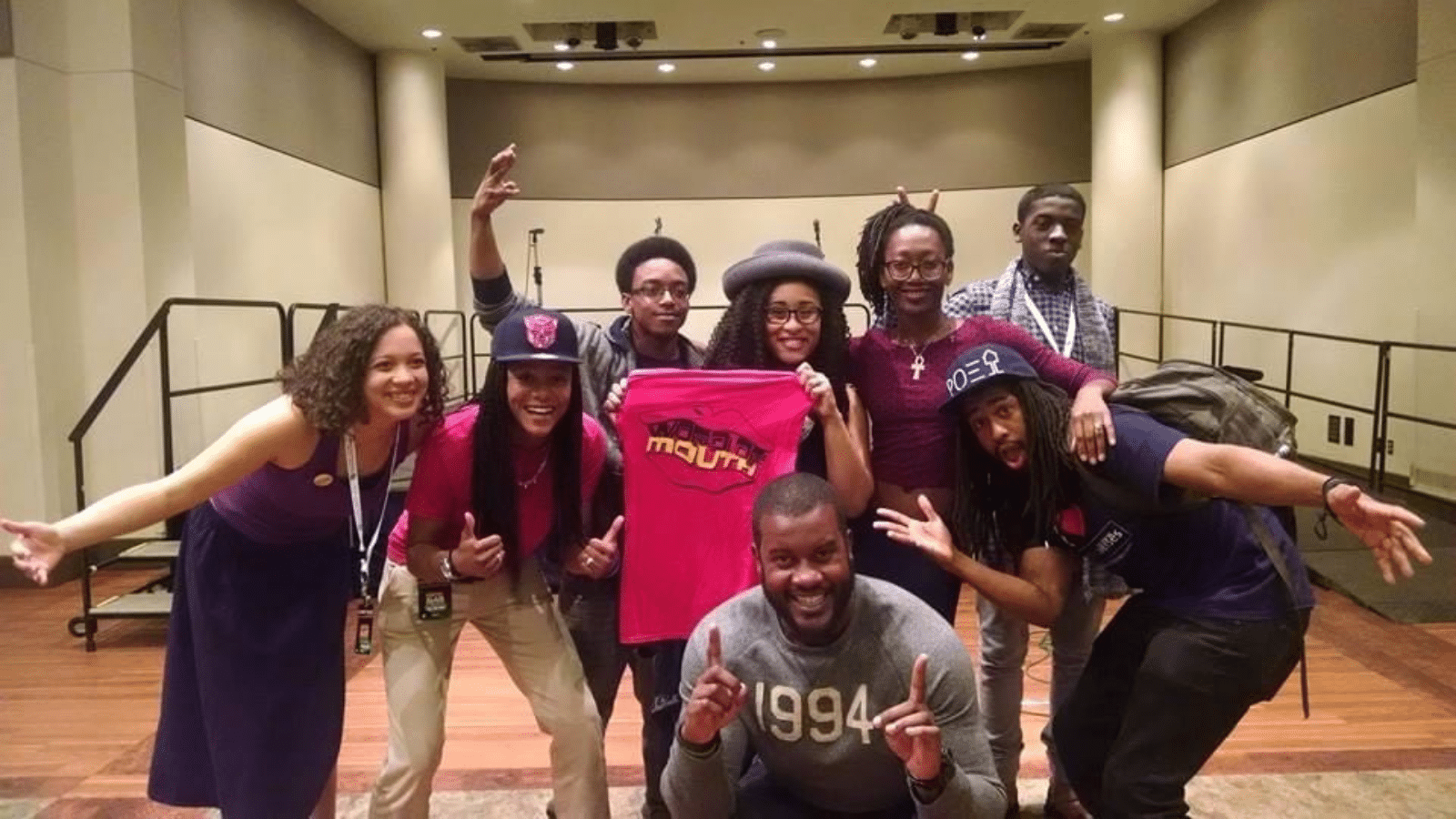
Munazza found her passion for spoken word poetry by joining Word of Mouth, the slam team at East Carolina University.
As a DC SCORES poetry specialist, Munazza endeavors to foster similarly creative and supportive environments for poet-athletes. Poetry specialists, who are professional spoken word poets, work with the nonprofit’s writing team to lead workshops on composition, slam etiquette, and performance. Last year, Munazza hosted online sessions for five DC SCORES teams to help them prepare for the organization’s end-of-season poetry slam.
“The things they came up within our sessions were just really amazing,” says Munazza, who still remembers one particularly powerful line from a student’s poem. “I remember they described bullying as something like ‘an autumn tree that never gets its leaves back.’”
“The poet-athletes are very courageous and just how deep they dig in, that’s what you get when you ask young people how they actually feel,” she adds. “It gives me so much hope for the future, as cliché as that sounds. I’m hopeful because in poetry spaces, these kids are developing emotional intelligence, which was not a common focus in grade school, and their emotions are being validated, which was also uncommon.”
“Feel My Message Just As Potent”
Inclusive and validating spaces are not only important for fledgling poets like those at DC SCORES. They underpin the very culture of slam poetry.
In fact, that is one of the reasons WOWPS exists. The slam and festival began in 2008 as an event designed to explicitly celebrate the work of women and femme poets from around the world. In a genre that has been traditionally dominated by cisgender men, WOWPS bills itself as a space where “womxn are centered, safe, and encouraged.”
Munazza, whose work focuses on historically oppressed communities, as well as her own experiences as a Black woman “wanting to build community and not feeling that sense of belonging just yet in certain spaces,” cannot overstate the importance of the slam community for womxn poets.
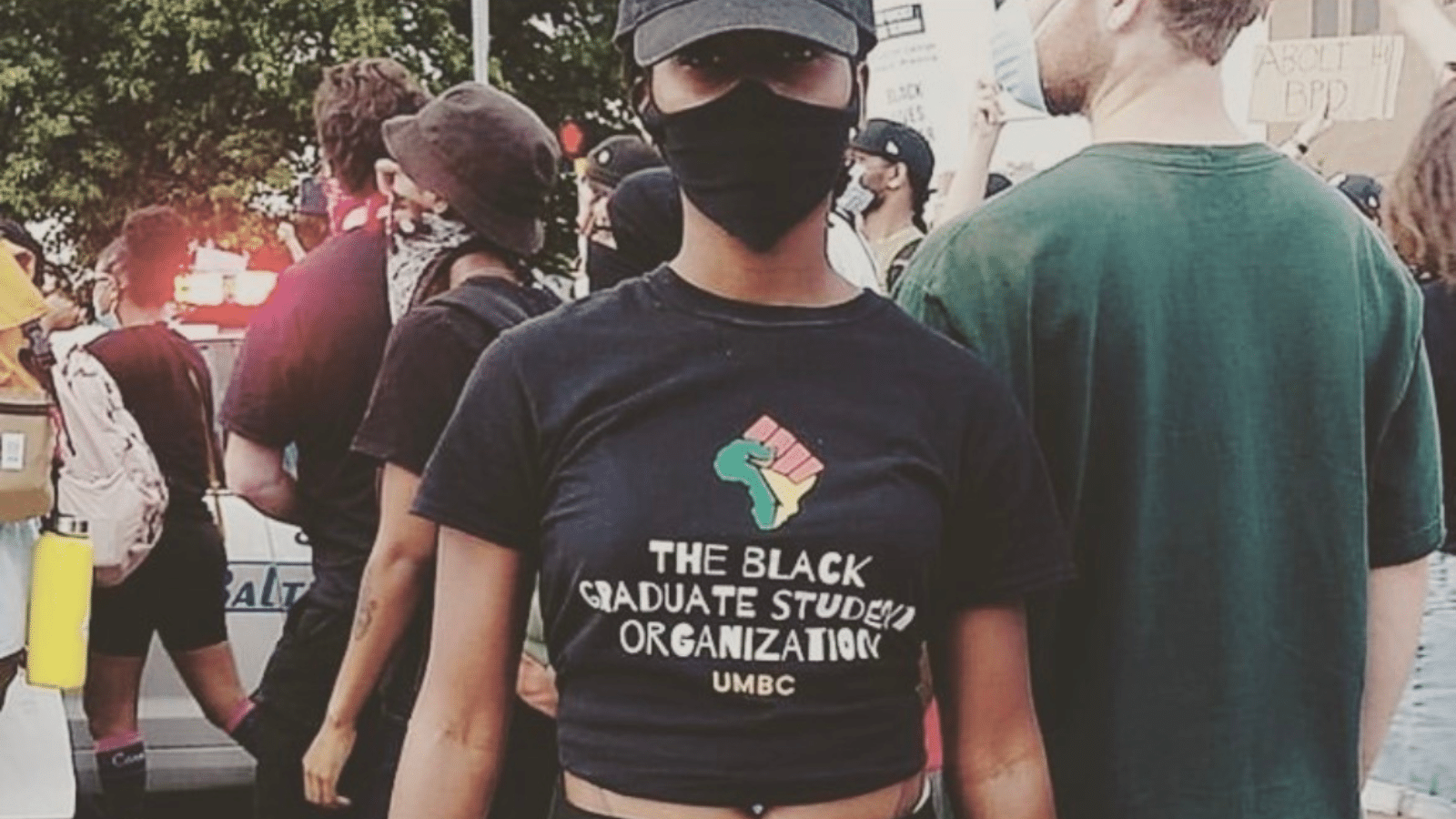
Munazza is passionate about social justice and hits out against misogyny, racism, and classism in her poetry.
“That representation, it just hits different,” she explains. “Our messages are received differently with this audience, they are more respected.”
Historically, Munazza says, cisgender men’s deeper voices and physical stage presence are more valued by audiences and judges in traditional slams, meaning that the thematic content of womxn’s poetry is likely to be overlooked.
“WOWPS is trying to remove that barrier and allow people to see the power of our voices as they are, no matter how dainty it sounds or what type of body I have,” she says. “You can still hear me and feel my message just as potent.”
What’s more, womxn-led events like WOWPS create powerful affinities between the poets who attend. While the main component of WOWPS is the slam competition, the festival also hosts workshops, networking events, film screenings, and wellness practices. “It’s like a conference of poets that are just here being vulnerable together in the same space,” says Munazza.
A Generation of Changemakers
For her WOWPS debut, Munazza will perform poems that focus on the barriers faced by people with criminal records or histories of incarceration. These themes are issues she regularly encounters in her day job as a clinical and community psychology student focused on psychotherapy, healing, and restorative justice for historically oppressed communities.
Munazza serves predominantly Black and low-income communities, which she notes are disproportionately harmed by the criminal legal system. Often, these communities are silenced by institutions that have power over their lives, including prison systems, education bodies, housing authorities, and medical institutions. Their voices are also frequently absent within the field of academia itself.
To counter this erasure, Munazza has brought her passion for poetry and social justice into the undergraduate classes she teaches at UMBC. By engaging with poems, stories, and discussions reflecting the marginalized communities they will serve, Munazza’s students develop a level of critical consciousness to better understand these communities’ needs and their own social positioning.
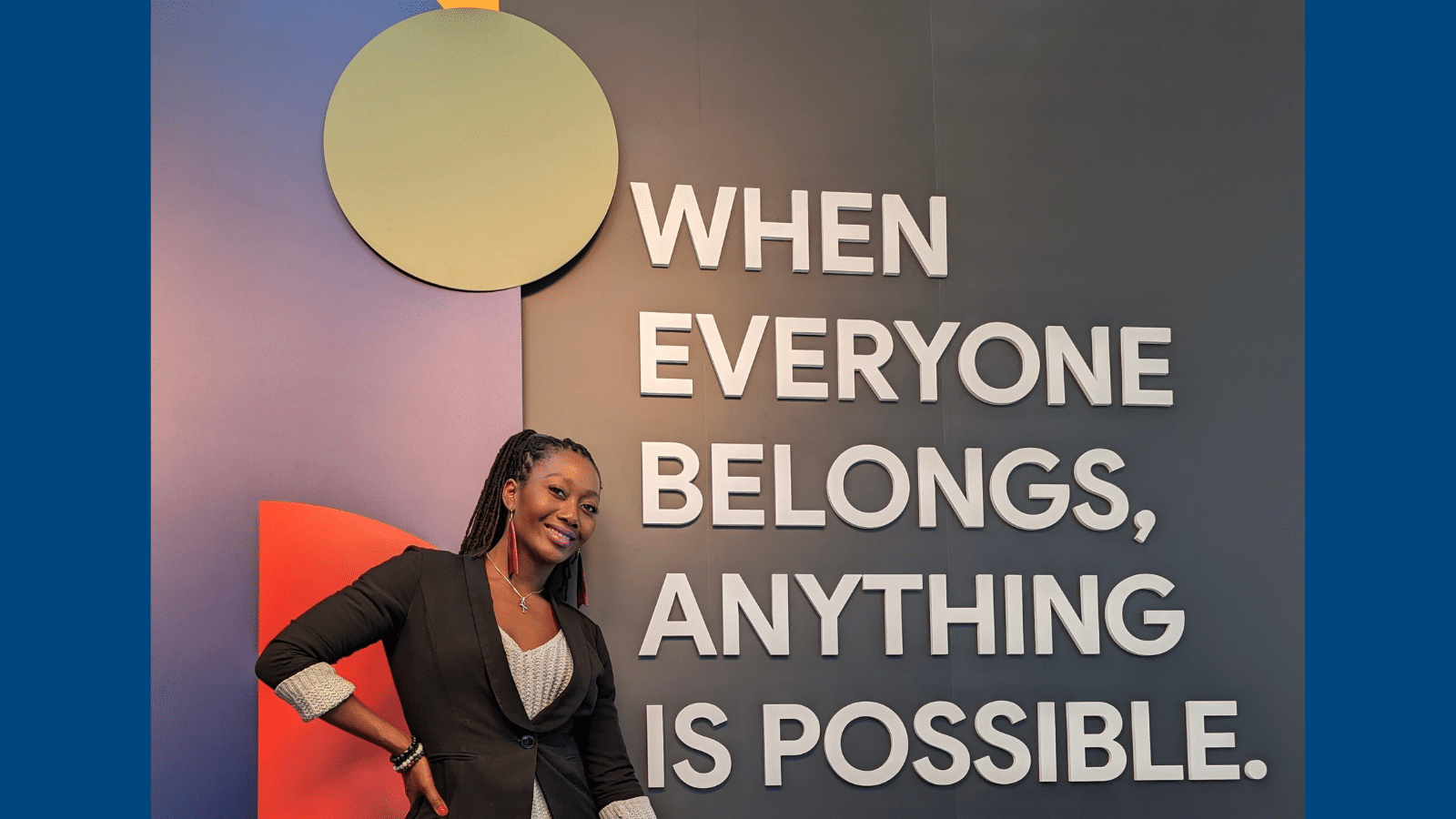
Munazza brings diverse voices into her teaching at UMBC to elevate the narratives of communities that are often erased by powerful institutions.
Elevating narratives that aren’t limited by the language of academia or “professionalism” creates an opening for students to express themselves authentically, too, generating a practice of self-reflection that Munazza says is central to community psychology work. As such, Munazza asks her students to “reflect on their values, their identities, how society influences who they believe they are, and how their values can drive who they become, as well as who they serve.”
“You need to know what you’re about and why you’re actually doing this work, [you need to know] more about the communities you’re serving and your privileges,” she says. “Poetry is raw and honest. It allows my students to think about how we can see things differently.”
By opening up new forms of expression for both her college students and DC SCORES poet-athletes, Munazza hopes to empower them to transform their communities and seek new and imaginative routes to justice. “When you control how someone expresses themselves, and how they write and how they talk, you control their narratives…For me, poetry was the only space where no one cared where you put a comma,” she explains.
“I want [poet-athletes] to use their wildest imaginations and values to figure out solutions to immigration policies, equity issues, Black maternal health, all these things that are really huge,” Munazza continues. “This is the era of change-makers, so it’s gonna happen.”

